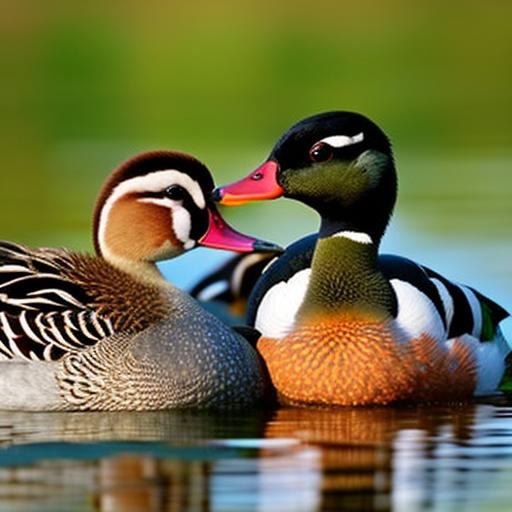Ducks are not only adorable and entertaining, but they can also be a valuable addition to any flock. While some duck breeds can be more aloof or skittish, there are several friendly duck breeds that are known for their sociable and affectionate nature. These breeds make great companions and can provide a range of benefits, from fresh eggs to emotional support. Whether you are a beginner or an experienced duck owner, adding a friendly duck breed to your flock can be a rewarding experience.
Key Takeaways
- Friendly duck breeds make a great addition to any flock, providing both eggs and companionship.
- The top 5 friendly duck breeds for beginners are Pekin, Khaki Campbell, Rouen, Swedish, and Welsh Harlequin.
- Raising friendly duck breeds can provide benefits such as pest control, fertilizer, and emotional support.
- When choosing a friendly duck breed, consider factors such as size, temperament, and egg-laying ability.
- Proper care for friendly duck breeds includes providing appropriate housing, feeding, and health considerations.
Top 5 Friendly Duck Breeds for Beginners: Easy to Raise and Loving Companions
1. Pekin Ducks: Pekin ducks are one of the most popular duck breeds for beginners. They are known for their friendly and docile nature, making them easy to handle and care for. Pekin ducks are also excellent egg layers, producing large white eggs that are perfect for baking or cooking. They have a distinctive appearance with their bright white feathers and orange bills, making them a beautiful addition to any flock.
2. Indian Runner Ducks: Indian Runner ducks are known for their unique upright stance and slender bodies. They are highly active and curious, always on the move and exploring their surroundings. Indian Runner ducks are friendly and sociable, often forming strong bonds with their owners. They are also excellent foragers and can help keep your garden free from pests.
3. Khaki Campbell Ducks: Khaki Campbell ducks are another popular choice for beginners. They are known for their calm and friendly temperament, making them easy to handle and train. Khaki Campbell ducks are also prolific egg layers, producing up to 300 eggs per year. Their eggs have a rich flavor and vibrant orange yolks, making them highly sought after by chefs and bakers.
4. Swedish Ducks: Swedish ducks are known for their friendly and gentle nature. They are highly sociable and enjoy spending time with their owners. Swedish ducks are also excellent foragers and can help control pests in your garden. They have a beautiful appearance, with their blue-gray feathers and bright orange bills.
5. Rouen Ducks: Rouen ducks are a larger breed known for their friendly and calm temperament. They are easy to handle and can be trained to follow simple commands. Rouen ducks are also excellent foragers and can help keep your garden free from pests. They have a striking appearance, with their vibrant green heads and rich brown feathers.
The Benefits of Raising Friendly Duck Breeds: From Eggs to Companionship
1. Health benefits of duck eggs: Duck eggs are not only delicious but also highly nutritious. They are rich in protein, vitamins, and minerals, making them a healthy addition to your diet. Duck eggs are also an excellent source of omega-3 fatty acids, which have been shown to have numerous health benefits, including reducing inflammation and improving brain function.
2. Companionship and emotional benefits of raising ducks: Ducks are highly social animals and form strong bonds with their owners. They enjoy spending time with humans and can provide companionship and emotional support. Interacting with ducks has been shown to reduce stress and anxiety, improve mood, and promote overall well-being.
3. Environmental benefits of raising ducks: Ducks are natural foragers and can help control pests in your garden without the need for harmful chemicals. They eat insects, slugs, snails, and other pests that can damage your plants. By raising ducks, you can reduce the need for pesticides and create a more environmentally friendly garden.
How to Choose the Right Friendly Duck Breed for Your Needs: Size, Temperament, and More
When choosing a friendly duck breed for your flock, there are several factors to consider:
1. Size: Consider the size of the breed and whether it will be suitable for your available space. Larger breeds, such as Rouen ducks, will require more space than smaller breeds, such as Indian Runner ducks.
2. Temperament: Consider the temperament of the breed and whether it matches your preferences. Some breeds, like Pekin ducks, are known for their calm and docile nature, while others, like Indian Runner ducks, are more active and curious.
3. Egg production: If you are primarily interested in duck eggs, consider the egg production of the breed. Some breeds, like Khaki Campbell ducks, are prolific egg layers and can provide a steady supply of eggs throughout the year.
To research and find the right breed for your needs, consult reputable sources such as breed associations, books, and experienced duck owners. You can also visit local farms or poultry shows to see different duck breeds in person and learn more about their characteristics.
Caring for Friendly Duck Breeds: Housing, Feeding, and Health Considerations
1. Housing requirements for ducks: Ducks require a safe and secure housing area to protect them from predators and the elements. The housing should provide enough space for the ducks to move around comfortably and have access to fresh water for swimming. It should also have proper ventilation to prevent respiratory issues.
2. Feeding and nutrition needs: Ducks require a balanced diet that includes a combination of commercial duck feed, fresh vegetables, and access to clean water for drinking and swimming. It is important to provide a varied diet to ensure they receive all the necessary nutrients.
3. Common health issues and how to prevent/treat them: Ducks are generally hardy animals but can be susceptible to certain health issues. Common health issues in ducks include respiratory infections, parasites, and bumblefoot. To prevent these issues, provide a clean and dry living environment, regular veterinary check-ups, and a balanced diet. If any health issues arise, consult a veterinarian for proper diagnosis and treatment.
Training Friendly Duck Breeds: Tips for Bonding and Building Trust

Bonding with your ducks is important for building trust and establishing a strong relationship. Here are some tips for training and bonding with your ducks:
1. Spend time with your ducks: Spend regular time with your ducks, talking to them, and offering treats. This will help them become familiar with your presence and associate you with positive experiences.
2. Use positive reinforcement: Use treats and praise to reward desired behaviors, such as coming when called or following simple commands. Ducks are intelligent animals and can quickly learn to associate certain behaviors with rewards.
3. Be patient and consistent: Training ducks takes time and patience. Be consistent in your training methods and expectations, and remember that each duck is an individual with its own personality and learning pace.
Socializing Friendly Duck Breeds: Encouraging Positive Interactions with Humans and Other Animals
Socializing ducks is important for their overall well-being and helps them develop positive relationships with humans and other animals. Here are some tips for socializing ducks:
1. Start early: Begin socializing ducks from a young age to help them become comfortable around humans and other animals. Handle them gently and expose them to different environments, sounds, and experiences.
2. Offer treats: Use treats to encourage positive interactions with humans and other animals. Ducks quickly learn to associate treats with positive experiences, which can help build trust and confidence.
3. Introduce gradually: When introducing ducks to other animals, do so gradually and under controlled circumstances. Monitor their interactions closely to ensure the safety of all animals involved.
The Best Activities for Friendly Duck Breeds: Swimming, Foraging, and More
Providing enrichment activities for your ducks is important for their physical and mental well-being. Here are some of the best activities for friendly duck breeds:
1. Swimming: Ducks are natural swimmers and enjoy spending time in the water. Provide a shallow pool or pond for them to swim and splash around in.
2. Foraging: Ducks are excellent foragers and enjoy searching for food in the grass and soil. Create a foraging area in your garden where they can search for insects, worms, and other tasty treats.
3. Environmental enrichment: Provide toys, such as floating objects or mirrors, to stimulate your ducks’ curiosity and keep them entertained. You can also create obstacle courses or hiding spots to encourage physical activity and mental stimulation.
Common Myths About Friendly Duck Breeds: Separating Fact from Fiction
There are several common myths about ducks that can lead to misconceptions about their behavior and care. Here are some common myths about friendly duck breeds:
1. Myth: Ducks are messy and require a lot of maintenance.
Fact: While ducks do produce waste, proper housing and regular cleaning can help manage their mess. Ducks can be trained to use specific areas for bathroom purposes, reducing the mess in their living space.
2. Myth: Ducks are noisy and disruptive.
Fact: While ducks can make noise, especially during mating season, not all duck breeds are excessively loud. Some breeds, like Pekin ducks, are relatively quiet and make minimal noise.
3. Myth: Ducks are difficult to care for and require specialized knowledge.
Fact: While ducks do have specific care requirements, they are generally hardy animals that can adapt well to different environments. With proper research and preparation, anyone can successfully care for ducks.
Why Friendly Duck Breeds are the Perfect Addition to Any Homestead or Backyard
In conclusion, friendly duck breeds can be a wonderful addition to any homestead or backyard. They provide companionship, fresh eggs, and environmental benefits while being relatively easy to care for. Whether you are a beginner or an experienced duck owner, adding a friendly duck breed to your flock can bring joy and fulfillment to your life. So why not consider adding some friendly ducks to your flock and experience the many benefits they have to offer?
If you’re interested in friendly duck breeds, you might also want to check out this informative article on creating the perfect chicken coop and nest box. Having a well-designed coop is essential for the comfort and safety of your feathered friends. This article from Poultry Wizard provides valuable insights on how to build a functional and cozy coop that meets the needs of your chickens. To learn more, click here: https://poultrywizard.com/keeping-chickens/chicken-coop-nest-box/.
FAQs
What are friendly duck breeds?
Friendly duck breeds are those that are known for their docile and sociable nature. They are easy to handle and make great pets for families.
What are some examples of friendly duck breeds?
Some examples of friendly duck breeds include the Pekin, Muscovy, Rouen, and Swedish ducks.
Are all duck breeds friendly?
No, not all duck breeds are friendly. Some breeds are known for being more aggressive or skittish, and may not make good pets.
What makes a duck breed friendly?
A friendly duck breed is typically one that has been selectively bred for docility and sociability. These ducks are often raised as pets and have been socialized with humans from a young age.
Can friendly duck breeds be raised for meat or eggs?
Yes, many friendly duck breeds are also raised for their meat and eggs. However, it is important to note that some breeds may be better suited for meat production while others are better for egg production.
What should I consider before getting a friendly duck breed?
Before getting a friendly duck breed, you should consider factors such as space requirements, diet, and the amount of time and effort required to care for them. You should also check local regulations to ensure that you are allowed to keep ducks as pets in your area.
Meet Walter, the feathered-friend fanatic of Florida! Nestled in the sunshine state, Walter struts through life with his feathered companions, clucking his way to happiness. With a coop that’s fancier than a five-star hotel, he’s the Don Juan of the chicken world. When he’s not teaching his hens to do the cha-cha, you’ll find him in a heated debate with his prized rooster, Sir Clucks-a-Lot. Walter’s poultry passion is no yolk; he’s the sunny-side-up guy you never knew you needed in your flock of friends!







